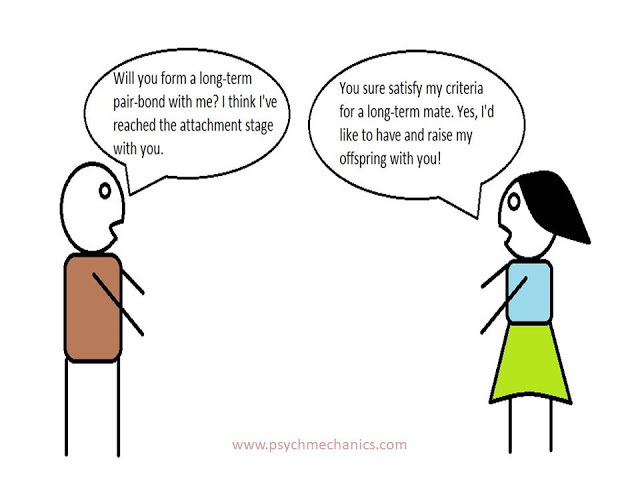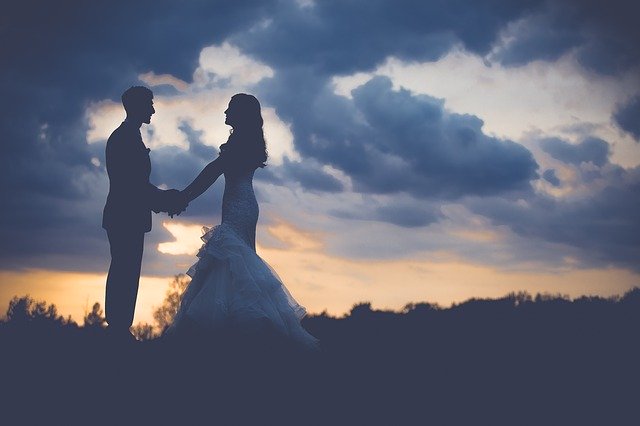This article will discuss the 3 stages of love in psychology i.e. lust, attraction and attachment. We’ll go into detail about the physiological and psychological changes that happen in you as you progress through these stages.
Love has baffled poets, mystics, philosophers, and scientists for ages. It’s a central theme in many movies, songs, novels, paintings, etc.
But love isn’t unique to humans. If we take the formation of long-term pair bonds as the criterion for the existence of love, other mammals and birds also show this tendency to fall in love.
The other important criterion for the existence of love is a huge parental investment in offspring.
As humans invest a lot in their children, the emotion of love evolved in us to throw us into the company of the person we love long enough to successfully raise children.
The three stages of love
One important factor contributing to the mystery surrounding the emotion of love is that it’s not a simple emotion.
The emotion of anger, for example, is easy to understand. Someone does something that violates your rights or hurts your interests and you feel anger towards them.
But love, especially romantic love, is more complex than that. To ease you into understanding the stuff that love is made of, it helps to think of love as comprising various stages. Stages that people go through when they fall in love, right from the moment they feel the first pang of desire to establishing a secure, long-term relationship.
1) Lust
Lust is the first stage of love where you first begin to like a person. It’s the stage when you have a crush on someone. You may like the way they look, talk, walk or move. Or you may fall in love with their attitude and personality.
Lust is the basic sex drive that motivates a person to seek a range of mating partners. In marketing, we’re taught what is known as the sales funnel.
At the top of the funnel are prospective customers who show an interest in your product but may not necessarily buy your product. The bottom of the funnel comprises the fewer people who’re ready to buy from you.
In a similar vein, you might be interested in many people sexually, but you may not seek to establish a lasting relationship with all of them.
The physical symptoms of the lust stage include flushing when talking to your crush, trembling, and an increased heart rate.1
Your hormones are raging. Dopamine creates feelings of euphoria while adrenaline and norepinephrine are responsible for increased heartbeat and restlessness.
The psychological symptoms may include sexual excitement, fantasizing about your crush, and anxiety that stems from the fear of getting rejected. As a result, you behave extra carefully around your crush. You walk on thin ice, making sure they don’t see your bad side.
You’re constantly under the pressure of trying to impress your crush and not doing anything silly to turn them off. This causes anxiety and you may find yourself committing silly speech and body mistakes in their presence, thanks to your increased level of self-consciousness.
For example, you might find yourself talking absolute nonsense in the presence of your crush. It’s because your mind is preoccupied with your crush, not with what you should or shouldn’t be saying.
2) Attraction/Infatuation
This is the next stage where you feel a strong attraction to your crush. You get obsessed with them. In this stage, you’re strongly motivated to pursue your potential partner.
This usually happens when your crush also has indicated some interest in you. If lust evolved to keep many sexual partners in our radar, attraction evolved to pursue those among them who’re likely to reciprocate our feelings.
The attraction phase activates the reward systems of your brain as you feel an overwhelming fixation with your partner. The same part of the brain is activated in those with obsessive-compulsive disorder.2
You may spend a lot of time stalking their social media profile and you may ‘accidentally’ bump into them at work. While asleep, you might dream about spending time with them.
It’s at this love stage where love makes you blind. You see your partner in a positive light only and overlook their flaws as endearing quirks.
In the words of Helen Fischer, author of Anatomy of love, “Infatuation is a stage where a person keeps popping into your brain and you can’t get them out. Your brain focuses on the positive qualities of the sweetheart and ignores their bad habits.”
Infatuation is your mind’s attempt to form a bond with your potential partner. It’s an emotion so powerful that it puts on hold your rational thinking faculties.
Essentially, your brain wants to fool you into thinking that this person you’re hooked to is ideal, long enough for you to have kids with them.
Finding a mate and reproducing is too important a task, evolutionarily speaking, to think rationally about the shortcomings of your potential partner.
3) Attachment/Rejection
When romantic attraction fades away, a stage comes when the blinding effect of hormones and neurotransmitters ends and you finally begin to see your partner for who they really are.
If they satisfy your criteria for a long-term mate, you become attached to them and if they don’t, you reject them.
On the contrary, if you’re rejected you sink into the depths of despair and if you’re accepted as a long-term mate, you’re elated.
In this stage, you ask yourself questions like, “Can I trust my partner?” “Will they be there for me?” Can I spend the rest of my life with them?”
If these questions get answered in the affirmative, attraction then cements into a stable long-term attachment. You may no longer be crazy about each other, but you know you want to be with each other.

If you know you’re not a good fit but hold on to the relationship, you begin to harbour the feelings of resentment that will eventually break down the relationship.
In the attachment stage, endorphins and hormones vasopressin and oxytocin flood your body creating an overall sense of well-being and security conducive to a lasting relationship.3
The attachment stage, therefore, evolved to motivate individuals to remain together long enough to complete their parenting duties.
References
- Crenshaw, T. L. (1996). The alchemy of love and lust. Simon & Schuster Audio.
- Aron, A., Fisher, H., Mashek, D. J., Strong, G., Li, H., & Brown, L. L. (2005). Reward, motivation, and emotion systems associated with early-stage intense romantic love. Journal of neurophysiology, 94(1), 327-337.
- Loyola University Health System. (2014, February 6). What falling in love does to your heart and brain. ScienceDaily. Retrieved January 28, 2018 from www.sciencedaily.com/releases/2014/02/140206155244.htm

